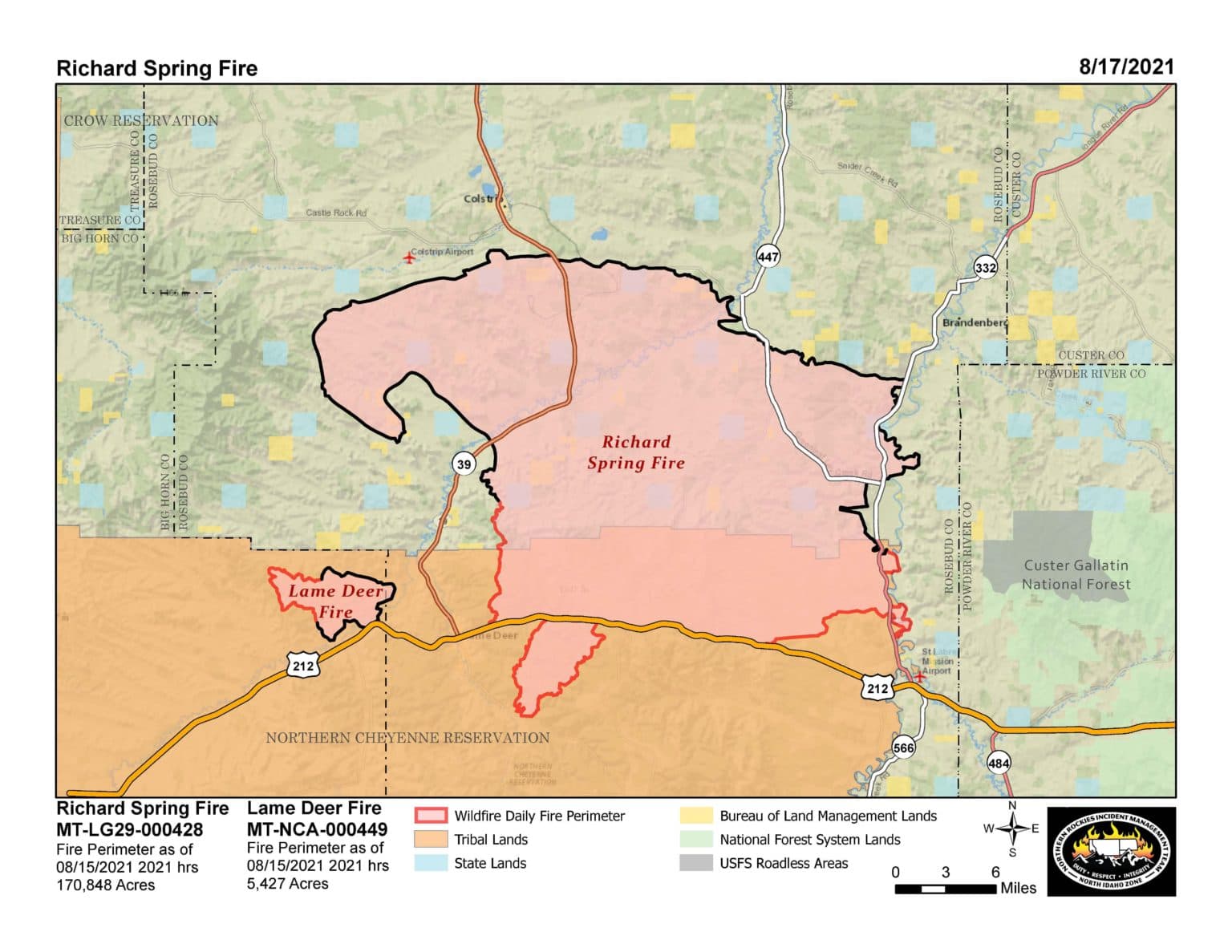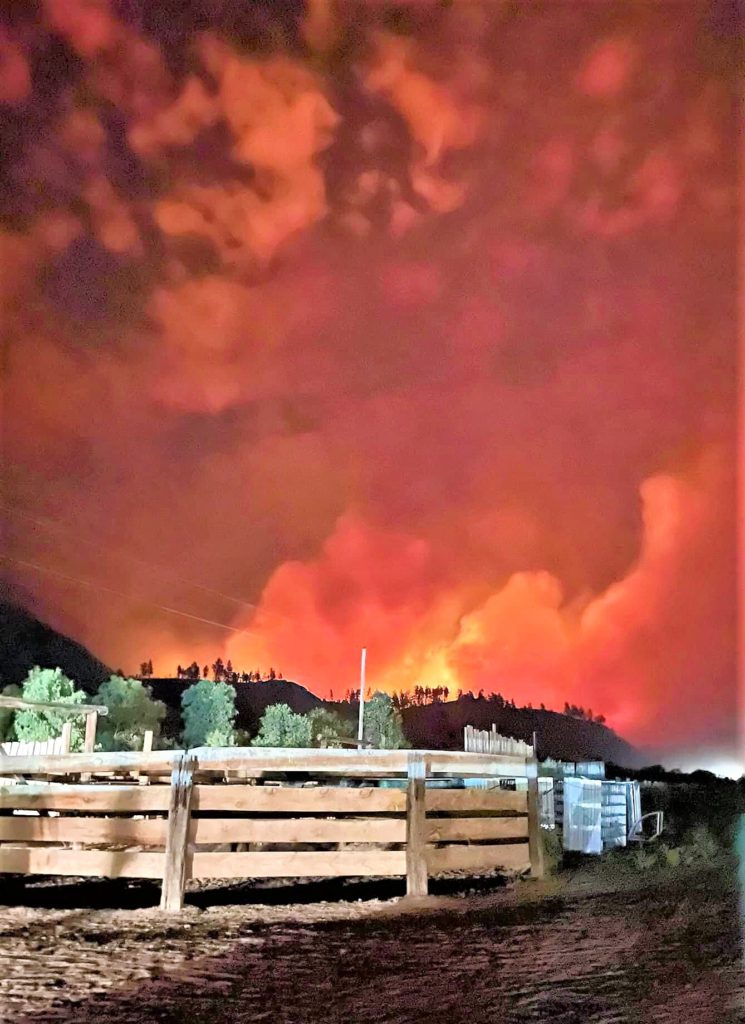
A wildfire that scorched more than 175,000 acres of Northern Cheyenne timber and rangeland underscored the urgency of the most recent global warming report. Indigenous environmental leaders said its scientific recommendations come none too soon for Native peoples feeling climate change effects firsthand.
The Intergovernmental Panel on Climate Change, or IPCC, released “Climate Change 2021: The Physical Science Basis” on Aug. 9. Approved by 192 U.N. member countries, the report summarizes the impacts of human activities on climate as “widespread, rapid, and intensifying.” Mounting greenhouse gas emissions from fossil fuel are driving a “megadrought” and worsening fire outlooks in the U.S. West, it says. It recommends cutting carbon pollution to zero as the only way to stabilize the planet’s temperature.
The Lame Deer and Richard Spring wildfires got underway on the eve of the report’s release date. The fires’ source was open coal seams smoldering, according to Montana authorities. As Northern Cheyenne evacuated homes, hundreds of firefighters met “critical fire weather conditions” during more than a week of blazes disastrous for grassland crucial to local ranchers. Conditions consisted of drought, low humidity, strong winds and high temperatures.

“The animal nations are crying; the earth is crying. This fire has a major impact on our community,” said Yellow Bird Life Ways Center Director Lynette Two Bulls. “We are connected to the land, we depend on it for our food, and medicines.” In a letter to raise funds for relief, she wrote, “We need your help with hay for our animal relatives; their grazing pastures have burned. Because of the drought it is already difficult to get hay in this area, so we have to look further and the costs increase. We need your support.”
The Blackfeet Nation announced in an Aug. 15 letter of solidarity that it was sending supplies. NDN Collective offered up to $10,000 in matching funds for the public’s donations to help with recovery. “We are living in an era witnessing the results of climate change,” said the non-profit based in Rapid City, S.D. “Let us pray for the Northern Cheyenne and surrounding relatives who are being heavily impacted by a massive wildfire tearing through their homelands.” Two Bulls thanked the organization for sending food boxes and six men to help protect homes and relatives.
NDN Collective Climate Justice Organizer Benjamin Yawakie pointed to the IPCC report as further proof that “we no longer have the comfort or convenience of time on our side. The time is now that we must act swiftly and boldly to protect Mother Earth for our future generations. Half measures will avail us nothing.”
“We are living in an era witnessing the results of climate change. Let us pray for the Northern Cheyenne and surrounding relatives who are being heavily impacted by a massive wildfire tearing through their homelands.”
NDN Collective
Issued to inform a quarter century of climate negotiations, the report is the first in a series to detail impacts by region. It says weather extremes will increase in all regions of the planet. Only if humanity succeeds in clamping down sufficiently on its greenhouse gas emissions will the Great Plains be among the North American areas to avoid the worst extremes threatening agriculture and health, according to the IPCC.
Negotiators have long-since agreed on a target to prevent a rise of more than 1.5 degrees Celsius above pre-industrial levels. However, the continent is on track for a 2-degree temperature increase. “Unless there are immediate, rapid and large-scale reductions in greenhouse gas emissions, limiting warming to close to 1.5°C or even 2°C will be beyond reach,” the report says.
The IPCC simply restates “what Black, Indigenous and people of the global majority already know because we are suffering: The impacts of climate change are already severe and widespread and are rapidly worsening,” Bemidji, Minn.-based non-profit Indigenous Environmental Network responded. “We cannot wait for drastic action. That includes a fast and just transition centered in Indigenous knowledge — away from fossil fuels.”
Human activity has “significantly altered” three-quarters of the land-based environment and two-thirds of marine habitat, according to the network. “On average these trends have been less severe or avoided in areas held or managed by Indigenous peoples and local communities,” it said in a written statement.
“It’s good to hear international scientists echoing what most of us can see with our own eyes — that climate change is real — and that it’s hurting people and our planet right now, today,” Mandan, Hidatsa, and Arikara citizen Lisa DeVille responded to the report. “Rising temperatures, drought, abnormally high rainfall, and flooding are just a few of the impacts we’ve seen near my home. This year smoke from wildfires has been filling our air and damaging our lungs.”
DeVille chairs the grassroots Fort Berthold Protectors of Water and Earth Rights, or POWER. She has a degree in Environmental Science from Nueta Hidatsa Sahnish Community College in New Town, N.D., and is a recipient of the North Dakota Human Rights Coalition “Arc of Justice Award” for outstanding environmental justice achievements. She is a board director of the Western Organization of Resource Councils, or WORC, a wife and mother.
She spoke as a guest at a conference hosted by ClimateNexus, a non-profit project sponsored by Rockefeller Philanthropy Advisors. Its mission is “to inspire, inform, and elevate constructive and equitable action on climate change.”
“It’s good to hear international scientists echoing what most of us can see with our own eyes — that climate change is real — and that it’s hurting people and our planet right now, today.”
Lisa Deville, Climate justice organizer
“My family and I are lifelong residents of Mandaree, N.D., on the Fort Berthold Reservation,” DeVille said. Fort Berthold is my home and the only land we have left that is part of my identity, she noted in reference to the theft of treaty-protected patrimony. “We live in front lines of the Bakken oil field — where we witness the environmental, social, and health impacts from oil and gas extraction,” she said. “The land near my home is crisscrossed with oil and gas pipelines and littered with drilling rigs,” she added.
“I live less than a mile away from well pads that vent and flare methane unchecked into our atmosphere, making local people like my husband and I sick. These impacts will only get worse if we continue to extract fossil fuels, including oil and gas, from our land and spew carbon and methane pollution into the air,” she remarked.
“The IPCC report confirms what we know firsthand — methane emissions are skyrocketing –, and the pollution from natural gas operations and oil production is a significant contributor to a global surge in this pollution,” DeVille remarked. “This potent greenhouse gas is many times more powerful than the carbon pollution that comes from smokestacks and tailpipes. Turning off the spigots spewing methane pollution is a critical piece of the climate change solution,” she said. “What we do in the next few years will determine what kind of world we leave to our children.”
Talli Nauman is a contributing editor at Buffalo’s Fire. Contact her at buffalo.gal10(at)gmail.com
Talli Nauman
Contributing Editor
Location: Spearfish, South Dakota
Spoken Languages: English, Spanish
Topic Expertise: Climate, Environmental and Social Justice; Right to know; Spearfish, South Dakota
See the journalist page© Buffalo's Fire. All rights reserved.
This article is not included in our Story Share & Care selection.The content may only be reproduced with permission from the Indigenous Media Freedom Alliance. Please see our content sharing guidelines.
The tree features names of missing Indigenous people
The billboard project is expanding to Oregon
Identification not yet made
UTTC International Powwow attendees share their rules for a fun and considerate event
Radio collaboration highlights importance of cooperation in a season of funding cuts for local media







